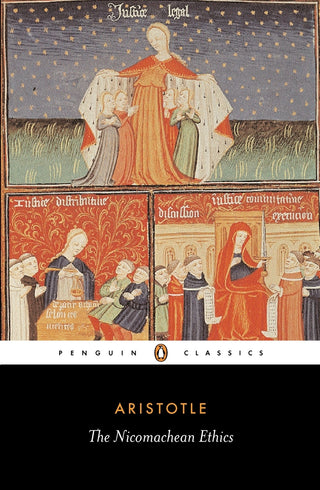The Nicomachean Ethics
- Unit price
- / per
-
Author:Aristotle
-
ISBN:9780140449495
-
Publication Date:October 2003
-
Edition:1
-
Pages:400
-
Binding:Paperback
-
Publisher:Penguin Books
-
Country of Publication:United Kingdom


A Back Order button means that we don’t have the book in stock at our store. It may already be on order – or we can order it for you from a publisher or distributor at no additional cost.
As we source items from around the globe, a back-order can take anywhere from 5 days to several weeks to arrive, depending on the title.
To check how long this might take, you’re welcome to contact us and we can provide an ETA or any other information you need. We recommend checking the timeframe before committing to an online order.
The Nicomachean Ethics
- Unit price
- / per
-
Author:Aristotle
-
ISBN:9780140449495
-
Publication Date:October 2003
-
Edition:1
-
Pages:400
-
Binding:Paperback
-
Publisher:Penguin Books
-
Country of Publication:United Kingdom
Description
Aristotole's examination of the nature of happiness
In the Nicomachean Ethics, Aristotle sets out to examine the nature of happiness.
He argues that happiness consists in 'activity of the soul in accordance with virtue', for example with moral virtues, such as courage, generosity and justice, and intellectual virtues, such as knowledge, wisdom and insight. The Ethics also discusses the nature of practical reasoning, the value and the objects of pleasure, the different forms of friendship, and the relationship between individual virtue, society and the State. Aristotle's work has had a profound and lasting influence on all subsequent Western thought about ethical matters.
Adding product to your cart
You may also like
A Back Order button means that we don’t have the book in stock at our store. It may already be on order – or we can order it for you from a publisher or distributor at no additional cost.
As we source items from around the globe, a back-order can take anywhere from 5 days to several weeks to arrive, depending on the title.
To check how long this might take, you’re welcome to contact us and we can provide an ETA or any other information you need. We recommend checking the timeframe before committing to an online order.
You may also like
You may also like
-
Aristotole's examination of the nature of happiness
In the Nicomachean Ethics, Aristotle sets out to examine the nature of happiness.
He argues that happiness consists in 'activity of the soul in accordance with virtue', for example with moral virtues, such as courage, generosity and justice, and intellectual virtues, such as knowledge, wisdom and insight. The Ethics also discusses the nature of practical reasoning, the value and the objects of pleasure, the different forms of friendship, and the relationship between individual virtue, society and the State. Aristotle's work has had a profound and lasting influence on all subsequent Western thought about ethical matters. -
-
Author: AristotleISBN: 9780140449495Publication Date: October 2003Edition: 1Pages: 400Binding: PaperbackPublisher: Penguin BooksCountry of Publication: United Kingdom
Aristotole's examination of the nature of happiness
In the Nicomachean Ethics, Aristotle sets out to examine the nature of happiness.
He argues that happiness consists in 'activity of the soul in accordance with virtue', for example with moral virtues, such as courage, generosity and justice, and intellectual virtues, such as knowledge, wisdom and insight. The Ethics also discusses the nature of practical reasoning, the value and the objects of pleasure, the different forms of friendship, and the relationship between individual virtue, society and the State. Aristotle's work has had a profound and lasting influence on all subsequent Western thought about ethical matters.-
Author: AristotleISBN: 9780140449495Publication Date: October 2003Edition: 1Pages: 400Binding: PaperbackPublisher: Penguin BooksCountry of Publication: United Kingdom
-



